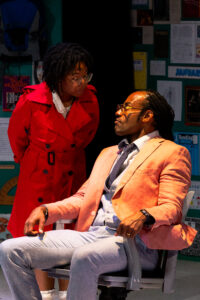
From left Pamela S. Hankerson, Jason Peck, Sarah Romeo, Elizabeth Price and Seth Trucks / Morgan Sophia Photography.
By Mariah Reed
Theatre Lab in Boca Raton is a professional theatre company that bravely chooses to dedicate itself to presenting new plays to South Florida audiences. Inherent in such a bold mission is the chance of an occasional misfire. Happily, this is not the case with their latest presentation, Idris Goodwin’s What’s Best for the Children.
Inspired by the ideological battle currently raging in the American school system, the play addresses the hotly debated subject of how to ensure a quality education for our country’s children. Depending upon one’s political leanings, what is considered an “appropriate” curriculum varies and, as a result, inordinate power is now in the hands of school board members who can adjust curriculum and the way it is taught.
Goodwin’s smart new play makes a mockery of the system by satirizing the trials and tribulations of Whit Forsyth, newly elected chair of the State Schoolboard Committee. Forsyth, the first Black chairman, is poised to vote on critical proposals that may radically change public education in his district. As he considers his stance on the issues, he finds himself quite literally shocked by the extreme ways in which various groups desperately attempt to influence his vote.
The first group to confront Forsyth comes from a place of liberal activism. The second are corporate conservatives that seek to eliminate portions of the curriculum that don’t suit their financial goals. The third touts AI as the future of education, suggesting that teachers are too fallible to trust with our children’s education. It’s as though the ghosts of Christmas past, present and future are warning Forsyth that we are on the cusp of a crisis, and he must choose to join one faction or the other. Curriculum is under the microscope and each group is lobbying for the ability to mold young minds to advance their agenda.

Sarah Romeo and Isaac Simmons
Isaac Simmons portrays Whit Forsyth as an elegant and thoughtful (if somewhat reluctant) advocate of public education. When pressed by an incompetent and corrupt media to articulating his position on the issues being debated, he chooses to remain mum. After being tortured, hypnotized, and immobilized by various special interest groups trying to convert him, he escapes. Later, when the Schoolboard Committee is predictably split on the issues requiring his vote, Forsyth’s tie-breaking choice is somewhat anticlimactic. The audience is never privy to his thought process nor the inciting incident which causes him to feel convicted one way or the other. Perhaps the seemingly random way in which these matters are concluded is purposeful; full of cynicism and highlighting the absurdity of the process.
An ensemble of five talented actors plays a variety of roles with impressive transformational skills. Especially amusing is Sarah Romeo who easily vacillates from the adorable kidnapper-with-a-vim-for-violence and the taciturn techno-genius, Acorn. Romeo easily garnered the lion’s share of the laughs on opening night with her impeccable comic timing and absolute commitment to her character’s intentions. Jason Peck is chilling in his portrayal of a corporate bigwig who will stop at nothing to ensure schools censor the teaching of history to support his financial investments. Moments later, Peck is hilarious as a suburban father who risks a heart attack to befriend and influence Forsyth on a neighborhood run.
Seth Trucks, Elizabeth Price, and Pamela S. Hankerson, also exhibit impressive comic prowess as a variety of characters. Together with Romeo and Peck, they masterfully create a world where absurdity abounds, and manipulation is king. Sound familiar?
Aubrey Kestell’s scenic design is a mind-bending series of walls festooned with cheery charts, carefully crafted diagrams, backpacks, colorful crayon boxes and a variety of splashy posters as found in the elementary school room of the Matt Stabilemost enthusiastic teacher ever. Behind a less animated cast the set might be distracting, however given the high-spirited and in-your-face way this presentation is delivered, it feels just right.
Actors are clad in typical school uniforms, and the minimal props and furniture support quick scene changes for a variety of locations. At eighty minutes, the production flies by and one is left feeling slightly overwhelmed but in a good way. This is the kind of theater that makes you think, question, and consider potential solutions. It is timely and important, and for that reason well worth the effort.
Don’t think you can simply sit back and passively observe Theatre Lab’s presentation. Upon arrival at the theater, audience members are given a pop quiz, hinting at the interactive nature of the production. And interactive it is. Characters routinely move through the audience with spirited rapping and confrontational quips. One is forced to engage, to truly listen, and to reflect upon one’s own understanding of the educational system. It is an occasionally uncomfortable play, as each perspective is portrayed as absolute and unbending. “How can consensus ever be achieved in such an atmosphere?” one wonders.
Matt Stabile directs his exuberant cast to zealously fling every iota of irony at his audience, confronting them with the extremism of opinions that are commonly articulated both in the media and school board meetings all over the U.S. today. Goodwin’s play doesn’t overtly take a stance on what curriculum should be taught or the way this should happen, but it hilariously skewers the system and serves as a warning that unless the public take notice, public education may well go the way of the prison system after corporatization.
What’s best for the children? Goodwin seems to indicate that rather than debate curriculum, we would do well to focus on the forces that influence those who are empowered to adjust it.
What’s Best for the Children runs through April 28, Fridays, and Saturday at 7:30 p.m. and Sundays at 3 p.m. presented by Theatre Lab, located at Parliament Hall, Florida Atlantic University, 777 Glades Road, Boca Raton. Tickets 561-297-6124 or www.fauevents.com/ The play runs for 90 minutes with no intermission. For special accommodations, please call 561-297-4784









 A PaperStreet Web Design
A PaperStreet Web Design
